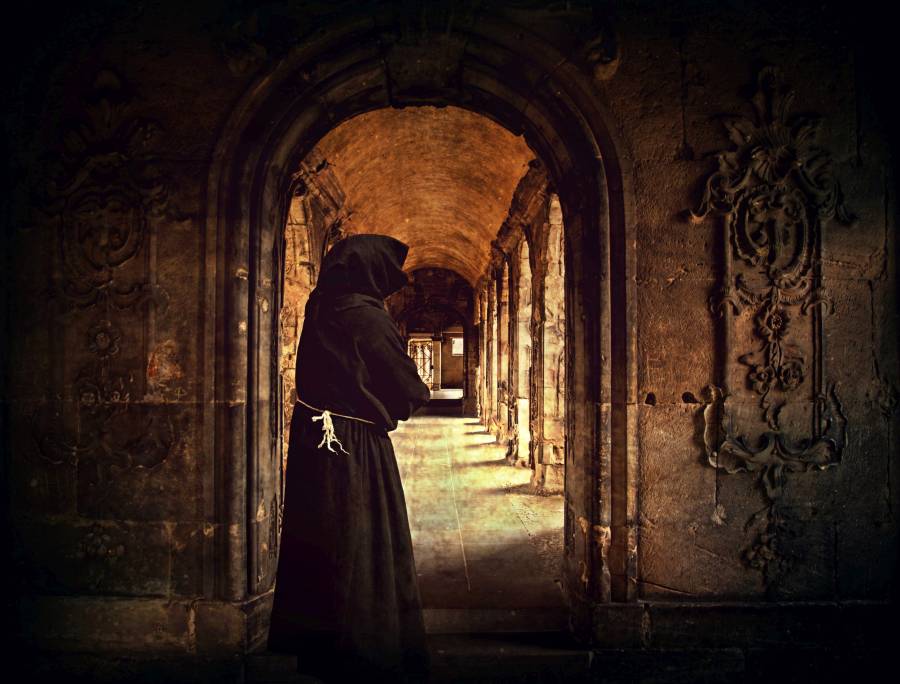What We Can Learn From Medieval Monks About Isolation

When I first visited a Benedictine monastery the monk who opened the door said, “Follow me. I’ll show you to your cell.”
“A cell!” I thought. “Just like a prison!”
The word “cell” comes from the Latin cella, the word for a small room, a store room or a hut. Each monk lives alone in his own room, and in some monastic traditions the cell has two doors: one into the larger monastery and another into the monk’s own, individual walled garden.
What is the point of living in such isolation? You might ask. The first monks went out to live in the desert caves of Egypt in the fourth century. They did so in an action of repentance and retreat from the world. They went to be alone with God and the word “monk” comes from the Greek word monos — which means alone.
The monks were isolated for the spiritual motivation of finding God in solitude. They were imitating Jesus who often went into the mountains alone to pray. Down through the ages monks and nuns have continued this tradition as an example for all people and a reminder that while we are called to love our neighbor we are first called to an exclusive, one-on-one relationship with God.
Guidelines for Making the Most of Isolation
Many of us now are facing isolation because of the coronavirus. To find ways to cope with the isolation we can turn to the practical experience of the monks and nuns who have perfected the art of solitude.
What are some basic guidelines for making the most of isolation? First is the need for routine. A routine gives structure to the day, and the first fixed points in the routine should be a time of prayer or meditation.
The monks broke their day down into three main activities: work, prayer and study.
In a monastery the day is punctuated with up to seven periods of prayer. Short services that are composed of a hymn, some psalms, a Scripture reading and prayer make up what is called the “Divine Office.” Christians of all traditions should keep their “quiet time” morning and evening as the fixed points in their schedule. Even those for whom a formal religious practice is not part of their lives can build a routine around two fixed points in the day to sit still, meditate and find the calm point within.
The monks broke their day down into three main activities: work, prayer and study. We have already seen how prayer becomes the backbone of the schedule. Work and study fit into the day in other equal parts. The work might simply be the day-to-day routine of cooking, cleaning, gardening, helping the family and keeping life ticking over. However, it might include your work from home, keeping in touch with other housebound friends and family or taking up a creative hobby or past time during your confinement.
Study for the medieval monks would have meant reading classic books, theology and sacred Scripture. For us “study” can include anything that feeds the mind positively. With our modern technology this could simply be reading, but it could also be watching a good film, listening to an educating podcast, taking part in an online book club, learning a new language or studying that special area of interest that you’ve been putting off.
Meaning and Direction
Breaking the day into segments of work, prayer and reading is practical because we get bored with any one activity for too long. Plus, as we change gears from work to prayer and from prayer to study the three activities cross pollinate one another. What we study enlightens our prayer and what we pray empowers our work. All three together help to give life meaning and direction.
Best of all, work, prayer and study improve the whole person. We are all little trinities of body, mind and spirit. The three parts of us need to be nurtured and nourished. Work builds up the body. Study builds up the mind and Prayer nourishes the Spirit.
Social distancing and isolation is nothing new, and learning from the wisdom of the past can help change this present crisis from a time of worry, fear and aimless waste into a productive, positive time—a time in which our lives can broaden and deepen in the best of ways.
Dwight Longenecker is a Catholic priest working in South Carolina. He is the author of Listen My Son-St Benedict for Fathers. Visit his website and blog at dwightlongenecker.com







